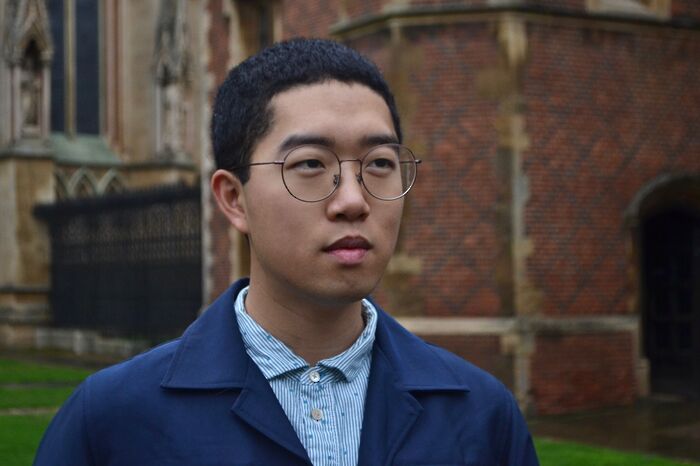Scholar and political icon Angela Davis reflects on activism past, present, and future at Corn Exchange
Over 1,000 listened as Davis, in conversation with poet and scholar Jackie Kay, spoke on ideas from prison abolition, to empty buzzwords of ‘diversity’ and ‘inclusion’, to how feminist thought may further evolve
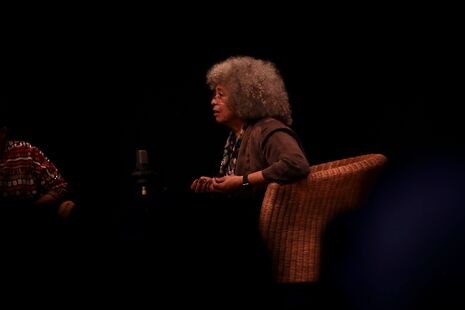
Yesterday evening in the high-ceilinged Corn Exchange building in Cambridge’s town centre, political activist and scholar Angela Davis and acclaimed poet Jackie Kay spoke to an enraptured audience of over 1,000 students, staff, alumni, and others.
Dr Mónica Moreno Figueroa, a Senior Lecturer in Sociology and the discussion chair introduced the two speakers, as latecomers trickled into the hall: “This event is historic. Two of the most powerful black women speaking and writing today are addressing us here in Cambridge”.
Throughout their talk, the two women traversed the histories of activist movements of their time, interrogated structures of capitalism and institutionalised marginalisation, and spoke of their hopefulness of tomorrow’s “revolutionaries”.
Organised by Decolonise Sociology and the Office of the Vice-Chancellor, the conversation formed part of discussions throughout Cambridge and universities both in the UK and elsewhere, to “decolonise and decentre knowledge” in university spaces, said Dr Moreno Figueroa in her opening remarks.
“People of colour cannot be the exception anymore, anywhere”, she added, saying she hoped the event would prove not to be of an exceptional type at Cambridge, but for it to be increasingly common.
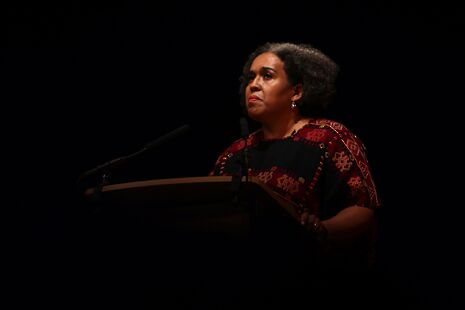
Jackie Kay, Scotland’s current poet laureate, opened her discussion with Davis with a poem, beginning: “On my bedroom wall, is a big poster of Angela Davis, who’s in prison right now for nothing at all — except, she wouldn’t put up with stuff”.
The poem documented Kay’s memory from her adolescence in suburban Glasgow of watching Davis, not only an innocent woman unjustly treated by the American criminal justice system, but also the “only female person I’ve seen, except for a nurse on TV, who looks like me — she has big hair like mine, that grows out, instead of down”.
“We are standing on the shoulders of the generation before us, and there will be those who stand on our shoulders”
Portraying a snapshot in time of a tumultuous moment in the history of civil rights in the United States, the poem provided a bridge to Davis’s reflections on her experiences of witnessing and taking part in the movement, and of reaching acclaim following her highly-publicised arrest and trial.
Davis’s appearance on the FBI’s ten-most-wanted list in 1970 earned her almost legendary status on the left, as she was already a prominent campaigner in civil rights activism, a member of both the Student National Coordinating Committee and Black Panther Party. Her arrest and 18-month imprisonment — she was acquitted in June 1972 — sparked international attention and a national campaign advocating for her release.
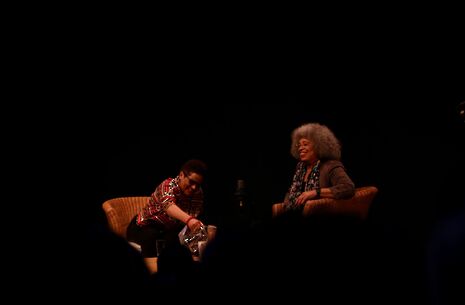
“I don’t know whether I had a sense of the enormity of it”, Davis responded, “But when I did think about it, I asked myself, well do I, as an individual, really deserve all of this attention?” [...] “I looked at the women who were in the jails where I was and I asked, well, who’s supporting them?”
She added later: “If someone told me that I could return and relive my life without that experience [of going to prison], I would probably say: ‘no, I don’t think so’.
“I learned how important it is to focus on those who have been cast aside and marginalised, I’ve been really fortunate to work with wonderful activists over the years developing the whole notion of the prison-industrial complex, and arguing for prison abolition.”
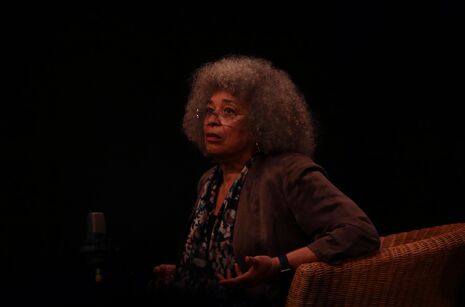
Davis also spoke of the times in activist movements where “many of us did not expect to survive, precisely because of the repression”.
“I constantly have to point out that it’s not fair to ask me to bear the burden as an individual of all of that history”, she added.
Over the two hours, the discussion moved seamlessly between the two scholars’ minds, in tune with each other and reflective of their shared memories of activist movements and scholarly evolution. The careers of both Kay and Davis had witnessed in them the evolution of feminist theory, which underwent transformative cycles from 1960s and 1970s feminism dominated by white women, of a “glass ceiling feminism” where “no one had really talked about the term, ‘intersectionality’”, toward how feminist thought has evolved into its current form.
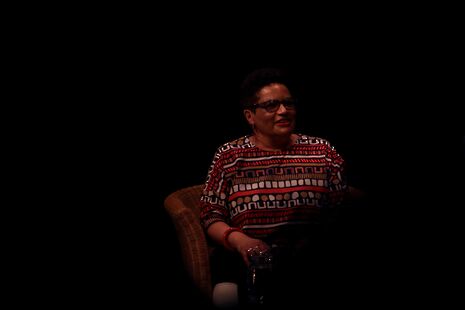
The two women traded laughs and anecdotes throughout: Kay translated her father’s thick Scottish accent for Davis’s benefit as an American from the South, and mused that in one conversation with her teenage son, he remarked that having a lesbian mother wasn’t “cool” (though, he added, a lesbian gran would be).
Kay later asked Davis about living in a ‘post-truth’ America, with the “current occupant of the White House”: “Horrendous”, Davis answered, but also “exciting”, in the resistance movements borne from the election of Donald Trump.
Later, Kay gestured to the crowd of many students and recent alumnae. “The future isn’t going to be Democrats or Republicans, or Labour or Conservatives, or whatever, it’s going to be this, this third way... When you look out here today, do you think, in some ways, ’here you are — yay!’”
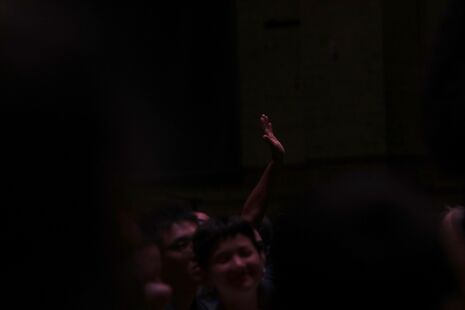
Davis added her views on this generational transfer of knowledge and passion: “If we manage to convey those struggles in such a way that another generation comes and takes it up and moves it further… you know, I always like the metaphor of that we are standing on the shoulders of the generation before us, and there will be those who stand on our shoulders, and those who are on our shoulders have a much longer vision — they’re able to see so much further.”
Indeed in the question-answer section of the event, Davis engaged with several attendees asking her to support, to provide advice, and share her generational wisdom to their own particular causes, including members of an ongoing anti-racism occupation at Goldsmiths University of London and a teacher in East London fighting against “the school-to-prison pipeline”. Other questions asked included what Davis’s thoughts were on the place of activism within the academy, of money in activism.
“So often, we take the products of capitalism [...] so for granted, that we have difficulty imagining a different way”, remarked Davis. “It helps to emancipate oneself from the notion that the only possible temporality is measured by the life of the individual, that our time is the time that is marked between our birth and our death dates”.
Throughout their two-hour conversation, Kay and Davis spoke at length about their past – the modern histories and struggles of activist movements, and the legacies they, and many others, will leave behind, passed on to a new, hopeful generation.
“We have to generate that hope. And hope is, as Walter Benjamin says, we are given hope for the sake of those who are without hope, and young people cannot live without hope. And that is why the real revolutionaries are always really the youth, are young people”, said Davis.
“I don’t mind being the person now who needs to learn to follow the leadership of young people — I like that. Don’t you?”
 News / Colleges charge different rents for the same Castle Street accommodation2 March 2026
News / Colleges charge different rents for the same Castle Street accommodation2 March 2026 News / News in Brief: waterworks, wine woes, and workplace wins 1 March 2026
News / News in Brief: waterworks, wine woes, and workplace wins 1 March 2026 News / Climate activists protest for ‘ethical careers policy’1 March 2026
News / Climate activists protest for ‘ethical careers policy’1 March 2026 News / Private school teacher who lied about Cambridge degree barred from teaching27 February 2026
News / Private school teacher who lied about Cambridge degree barred from teaching27 February 2026 News / Angela Merkel among Cambridge honorary degree nominees27 February 2026
News / Angela Merkel among Cambridge honorary degree nominees27 February 2026


